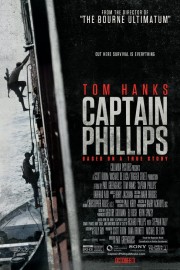Captain Phillips
The last time Paul Greengrass brought a true story to the screen, it was his heartbreaking 2006 film, “United 93,” about the one hijacked flight on 9/11 that didn’t reach its intended target. After that came another Jason Bourne thriller, “The Bourne Ultimatum,” and a fictional thriller set in Iraq, “Green Zone.” Whether it’s telling a true story, or a Hollywood genre film, his approach to the film remains the same: a cinematic style that is more akin to a documentary, and an approach to the narrative that is personal, and touches on the psychological toll the characters go through.
His new film, the heroic true story, “Captain Phillips,” follows the same storytelling rules of his previous films, but rather than an ensemble effort like he crafted (out of necessity) in “United 93,” “Phillips” is anchored by a tremendous and confident lead performance by Tom Hanks, in his finest single role since “Cast Away.” (Although his multi-character work in last year’s “Cloud Atlas” is still some of his best ever.) Here, Hanks plays Captain Richard Phillips, a cargo ship captain who was traveling along the African coastline in 2009 when his ship was boarded by Somali pirates. What transpired was a tense standoff that eventually lead to Phillips getting taken hostage by the pirates, taken off the ship in the lifeboat, and being a pawn in an eventual showdown with the US Navy that ended in Phillips being rescued safely, and three of the four pirates killed by Navy Seals.
This isn’t a one-performance movie, however, even though, with the exception of Catherine Keener in a brief role as Phillips’s wife, Hanks is the biggest name in the movie, by far. However, there’s another key performance that helps make the film far more dynamic than it could have been. The actor’s name is Barkhad Abdi, and he plays Muse, the leader of the pirates who take the ship. What could have simply been played as a sneering villain is, thanks to Billy Ray’s screenplay and Abdi’s performance, turned into something far more memorable. Like Phillips, Muse is just a person doing a job. He doesn’t want to see anyone hurt, but isn’t afraid to hurt anyone if he has to. All he wants to do is get on the boat, get paid, and get off. He’s made a total of $6 million doing this, but he hasn’t seen much of any of it; it’s almost entirely gone to the people above him who coordinate these hijackings. Muse likes the idea of the American dream, but he understands that, in his part of the world, it’s out of reach. Muse is the most compelling character in the entire film, and Abdi brings him to life in a riveting, unforgettable performance.
The ultimate triumph of this film, however, rests with Greengrass, whose up close and personal, hand-held approach to cinema (whether it’s escapist fare like “The Bourne Supremacy” or a true story like this film) establishes the energy of the film, and maintains it, even through bumpy waters. (And despite some sure-footed editing by Christopher Rouse, there are some lulls in the action and story.) Greengrass has only been on most people’s radar since his 2002 film, “Bloody Sunday,” but he’s worked in TV since the ’80s, and his touch with directing actors and ability to ring thematic and emotional complexity out of material rivals the great masters of the medium. He took what could have been a moderately intriguing genre series in the Bourne films, and turned them into a fascinating study in identity and geo-political messiness in the 21st Century. He examined the war in Iraq, and the snipe hunt for WMDs, through a microscope, and didn’t let us look away in his underrated 2010 film, “Green Zone,” And he made a film about a part of the most devastating attack on American soil in “United 93” that did what seemed impossible: turned unspeakable tragedy into a nonetheless heroic attempt by a few to stave off greater loss, without making a film that exploited our still raw feelings about that day. Now, he is working with a story of real heroism again, but in a way that asks us questions about whether the lives of a few are really worth risking for money. That’s a question both Captain Richard Phillips and Muse are forced to ask themselves at times in this film; that they both feel bound by their responsibilities to an employer to do what they do in the film tells us more about what kind of men they are than any individual actions they sometimes take.










